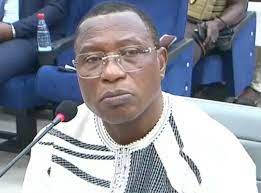APA- Conakry (Guinea) Three weeks after it was suspended following a grumble by lawyers on both sides of the trial divide, the case of the 28 September 2009 massacre in Guinea faces difficulties resuming.
By Aboubacar Siddy Diallo
The trial was scheduled to resume on Monday 21 June at the Dixinn Criminal Court, which has been transferred to the Conakry Court of Appeal. On Tuesday 20 June, the Guinean Bar Association had managed to persuade its members to return to the court, but a new incident disrupted this plan.
Prison guards blocked access to Conakry’s civil prison, where the eleven defendants accused of the 28 September massacre, in which more than 150 people were killed and several women raped, are being held.
“At the central prison, we were told that no extractions were possible, either at the central prison in Conakry or at other central prisons and courts throughout the country,” said Algassimou Diallo, prosecutor at the criminal court in Dixinn.
“Mr. President, since the accused are not in the courtroom, we are asking for a postponement so that we can continue the discussions we have started to see if we can reach a happy outcome,” prosecutor Algassimou Diallo pleaded.
Taking note of the facts, Judge Tounkara decided to postpone the hearing until 10 July 2023.
Strike paralyses courts and tribunals
The refusal to transfer prisoners from the Central Prison was due to a general and indefinite strike by prison guards. The guards in Guinea’s civilian prisons are demanding the application of the special status of prison administration staff and the appointment of 135 trainees to the civil service, explained Mamady 2 Camara, president of the Prison Staff Monitoring and Discipline Committee.
“We are demanding the application of the special status of prison administration staff and the recruitment of the 135 trainees who completed their training after one year without a diploma. The statute was signed in 2016, but seven years later it has still not been applied,” he told APA.
Firm stance by Justice minister
In response, the Minister of Justice deplored the “indiscipline” of the prison officers.
“It is unfortunate to note that all the efforts of the department, for personal reasons, are being rewarded by disciplinary lapses that have thwarted the continuation of the trial into the events of 28 September 2009, by intoxicating public opinion and thus depriving the prisoners of their right to a trial,” Alphonse Charles Wright lamented.
The minister called on the prisoners to dissociate themselves from the strike, which he described as an act of sabotage initiated by Mamady 2 Camara. He warned that blocking the prison could constitute a violation of the law.
Several former junta leaders, including Captain Moussa Dadis Camara and his former aide, Aboubacar Sidiki Diakité, known as Toumba, have appeared in the 28 September trial, which was opened in September 2009 to shed light on the events that took place at the 28 September stadium in 2009.
They are charged with murder, assassination, rape, pillaging, arson, armed robbery, assault, torture, kidnapping, sexual violence and indecent assault.
ASD/ac/lb/as/APA


